- Home
- Francine Rivers
As Sure as the Dawn
As Sure as the Dawn Read online
Praise for Francine Rivers
And the Shofar Blew
“Meticulously plotted, Francine Rivers’s new masterpiece, And the Shofar Blew, brims with unforgettable characters.”
—Romantic Times
The Atonement Child
“The Atonement Child is well written, presenting the truth about abortion in a compassionate, nonjudgmental way.”
—The Post-Abortion Review
The Last Sin Eater
“Rivers skillfully combines character and mood to create a haunting story that effectively depicts the horror of sin and the beauty of forgiveness.”
—CBA Marketplace
Leota’s Garden
“Francine Rivers is a master gardener, deftly pruning brush and deadwood, using poignant humor and bittersweet revelation to open hearts to reconciliation.”
—Romantic Times
Lineage of Grace series
“Readers will find this book worth reading more than once. . . . Masterfully written.”
—Romantic Times
“Rivers’s writing is excellent.”
—Publishers Weekly
“Rivers is such an excellent author. Her people are vibrantly alive, with all the strengths and weaknesses that make them so human.”
—Historical Novels Review
Mark of the Lion series
“Francine Rivers puts readers right into the history of the moment. . . .”
—Romantic Times
Redeeming Love
“. . . a splendid piece of work.”
—Library Journal
“Rivers shines in her ability to weave together spiritual themes and sexual tension in a well-told story, a talent that has propelled her into the spotlight as one of the most popular novelists in the genre of Christian fiction. This is one of her best.”
—Amazon.com
“The truth that ran through that book [Redeeming Love] absolutely brought me to my knees. I was a changed person after reading that book.”
—Amy Grant, singer/songwriter, in an interview with Ted Koppel, ABC Nightly News
“. . . a thought-provoking novel that you will not easily forget.”
—Romantic Times
Sons of Encouragement series
“. . . packs a powerful punch through characters that resonate in the soul. Fast-paced and seamless, this is a magnificent tale of courage, faithfulness, woe, and great joy.”
—Romantic Times
Visit Tyndale’s exciting Web site at www.tyndale.com.
Check out the latest about Francine Rivers at www.francinerivers.com.
TYNDALE and Tyndale’s quill logo are registered trademarks of Tyndale House Publishers, Inc.
As Sure as the Dawn
Copyright © 1995, 2002 by Francine Rivers. All rights reserved.
Maps on pages xvii–xix copyright © 1995 by Hugh Claycombe. All rights reserved.
Discussion Guide section written by Peggy Lynch.
Cover illustration copyright © 2008 by Robert Papp. All rights reserved.
Author photo copyright © 2003 by Phil Fewsmith. All rights reserved.
Cover designed by Ron Kaufmann
Interior designed by Zandrah Maguigad
Scripture quotations marked NIV are taken from the Holy Bible, New International Version,® NIV.® Copyright © 1973, 1978, 1984 by Biblica, Inc.™ Used by permission of Zondervan. All rights reserved worldwide.
Scripture quotations used in Discussion Guide are taken from the Holy Bible, New Living Translation, copyright © 1996. Used by permission of Tyndale House Publishers, Inc.,
Carol Stream, Illinois 60188. All rights reserved.
This novel is a work of fiction. Names, characters, places, and incidents either are the
product of the author’s imagination or are used fictitiously. Any resemblance to actual events, locales, organizations, or persons living or dead is entirely coincidental and beyond the intent of either the author or the publisher.
Library of Congress Cataloging-in-Publication Data
Rivers, Francine, date
As sure as the dawn / Francine Rivers.
p. cm. — (Mark of the lion)
ISBN 978-0-8423-3976-6
1. Church history—Primitive and early church, ca. 30-600—Fiction.
2. Rome—History—Empire, 30 B.C.-476 A.D.—Fiction. I. Title. II. Series:
Rivers, Francine, date Mark of the lion.
PS3568.I83165A9 1995
813′.54—dc20 95-1034
To my brother,
Everett Melbourne King, Jr., and his wife, Evelyn, I love you both and thank God we were together through the hard times.
Table of Contents
Foreword
Preface
Acknowledgments
Maps
Prologue
Part I: The Seed
Chapter 1
Chapter 2
Chapter 3
Chapter 4
Chapter 5
Chapter 6
Chapter 7
Chapter 8
Chapter 9
Chapter 10
Chapter 11
Part II: The Soil
Chapter 12
Chapter 13
Chapter 14
Chapter 15
Chapter 16
Chapter 17
Chapter 18
Chapter 19
Chapter 20
Chapter 21
Chapter 22
Chapter 23
Chapter 24
Chapter 25
Chapter 26
Chapter 27
Chapter 28
Chapter 29
Part III: The Growth
Chapter 30
Part IV: The Thorns
Chapter 31
Chapter 32
Chapter 33
Chapter 34
Chapter 35
Chapter 36
Chapter 37
Chapter 38
Chapter 39
Chapter 40
Chapter 41
Chapter 42
Chapter 43
Chapter 44
Chapter 45
Chapter 46
Part V: The Sacrifice
Chapter 47
Chapter 48
Chapter 49
Chapter 50
Chapter 51
Chapter 52
Chapter 53
Part VI: The Harvest
Chapter 54
Chapter 55
Epilogue
Glossary of Terms
Discussion Guide
Foreword
In 1992, Tyndale House made a conscious decision to begin publishing excellent fiction that would help us fulfill our corporate purpose—to “minister to the spiritual needs of people, primarily through literature consistent with biblical principles.” Before that time, Tyndale House had been known for many years as a publisher of Bibles and of nonfiction books by well-known authors like Tim LaHaye and James Dobson. We had dabbled in fiction before “Christian fiction” became popular, but it was not a major part of our publishing plan.
We began to recognize, however, that we could carry out our purpose very effectively through fiction, since fiction speaks to the heart rather than to the head.
Fiction is entertaining. Well-written fiction is gripping. As readers, we’ll stay up until 2:00 a.m. to finish a good novel. But Tyndale has a greater goal than simply entertaining our readers. We want to help our readers grow!
We recognize that authors have something of a bully pulpit for communicating their worldview and values to their readers. But with that opportunity comes a danger. Just what worldview and values is an author communicating? At best, most contemporary novelists present a s
quishy worldview. At worst, they sow negative values and unhealthy attitudes in the hearts of their readers. We wanted to set a whole new standard for fiction.
So we began looking for novelists who had a heart message that would help our readers grow. And we met Francine Rivers.
Francine had been extremely successful as a writer of romance novels for the general market early in her career. But when she became a Christian, she wanted to use her talents to communicate faith values to her readers. One of her early projects was the Mark of the Lion trilogy.
When I read the manuscript for the first book in the series, A Voice in the Wind, I was blown away by the power of the story. I was transported back to the first century—to Jerusalem, Germania, Rome, and Ephesus. I lived with Hadassah as she struggled to live out her faith in the midst of a pagan Roman household. I felt the terror of the gladiator as he faced his foes in the arena. Above all, through their experiences I learned lessons in courage.
We are proud to present this new edition of the Mark of the Lion. I trust it will speak to your heart, as it has to mine and to hundreds of thousands of other readers.
MARK D. TAYLOR
President, Tyndale House Publishers
Preface
When I became a born-again Christian in 1986, I wanted to share my faith with others. However, I didn’t want to offend anyone and risk “losing” old friends and family members who didn’t share my belief in Jesus as Lord and Savior. I found myself hesitating and keeping silent. Ashamed of my cowardice and frustrated by it, I went on a quest, seeking the faith of a martyr. A Voice in the Wind was the result.
While writing Hadassah’s story, I learned that courage is not something we can manufacture by our own efforts. But when we surrender wholeheartedly to God, He gives us the courage to face whatever comes. He gives us the words to speak when we are called to stand and voice our faith.
I still consider myself a struggling Christian, fraught with faults and failures, but Jesus has given me the tool of writing to use in seeking answers from Him. Each of my characters plays out a different point of view as I search for God’s perspective, and every day I find something in Scripture that speaks to me. God is patient with me, and through the study of His Word, I am learning what He wants to teach me. When I hear from a reader who is touched by one of my stories, it is God alone who is to be praised. All good things come from the Father above, and He can use anything to reach and teach His children—even a work of fiction.
My main desire when I started writing Christian fiction was to find answers to personal questions, and to share those answers in story form with others. Now, I want so much more. I yearn for the Lord to use my stories in making people thirst for His Word, the Bible. I hope that reading Hadassah’s story will make you hunger for the real Word, Jesus Christ, the Bread of Life. I pray that you will finish my book and pick up the Bible with a new excitement and anticipation of a real encounter with the Lord Himself. May you search Scripture for the sheer joy of being in God’s presence.
Beloved, surrender wholeheartedly to Jesus Christ, who loves you. As you drink from the deep well of Scripture, the Lord will refresh and cleanse you, mold you and re-create you through His Living Word. For the Bible is the very breath of God, giving life eternal to those who seek Him.
Francine Rivers, 2002
Acknowledgments
I want to thank my husband, Rick, for his continuing support and encouragement to stretch my wings and fly. I also thank God for my children, Trevor, Shannon, and Travis, who have taught me many invaluable lessons about life and love.
I also thank my editor, Karen Ball, for the use of her talents and expertise in fine-tuning ideas and improving my work. More important, I thank God for leading me to an editor who shares my vision and has faith exceeding my own.
“A farmer went out to sow his seed. As he was scattering the seed, some fell along the path, and the birds came and ate it up. Some fell on rocky places, where it did not have much soil. It sprang up quickly, because the soil was shallow. But when the sun came up, the plants were scorched, and they withered because they had no root. Other seed fell among thorns, which grew up and choked the plants, so that they did not bear grain. Still other seed fell on good soil. It came up, grew and produced a crop, multiplying thirty, sixty, or even a hundred times.”
Mark 4:3-8, NIV
“Jesus replied . . . ‘I tell you the truth, unless a [seed] falls to the ground and dies, it remains only a single seed. But if it dies, it produces many seeds.’”
John 12:23-24, NIV
Maps
The Roman Empire c. A.D. 117
The Journey to Germania c. A.D. 72 / The Ocean Route from Ephesus to Rome
The Overland Route from Rome to Germania
Prologue
A.D. 79
The guard of the lower dungeon threw the bolt and led the way. The sound of the Roman’s hobnailed sandals sent Atretes back to Capua. As he followed the guard, the smell of cold stone and human fear made the sweat break out on his skin. Someone cried out from behind a locked door. Others moaned in despair. Then, as they kept walking, Atretes heard something coming from the far end of the dank environs—a sound so sweet that it drew him. Somewhere in the darkness a woman was singing.
The guard slowed, tilting his head slightly. “Have you ever heard a voice like that in all your life?” he said. The singing stopped, and the guard walked more briskly. “She’s been in here for months, yet it doesn’t seem to affect her. Not like it does the others. A pity she’s going to die with the rest of them tomorrow,” he said. He paused before a heavy door, then threw the bolt.
Atretes stood on the threshold and looked from face to face inside the dim room. A single torch flickered in the mount on the sidewall, but the huddled forms in back were cast in shadows. Most of the prisoners were women and children. There were less than half a dozen old bearded men. Atretes wasn’t surprised. The younger men would have been saved for fighting in the arena.
Someone said his name and he saw a thin woman in rags rise from the mass of filthy captives.
Hadassah.
“Is that the one?” the guard said.
“Yes.”
“The singer,” he said. “You there! Come out!”
Atretes watched her as she picked her way across the room. People reached up to touch her. Some took her hand, and she smiled and whispered a word of encouragement before she passed by. When she reached the open doorway, she peered up at him with luminous eyes. “What are you doing here, Atretes?”
Unwilling to say anything in front of the Roman guard, he took her arm and drew her out into the corridor. The guard closed the door and set the bolt. He opened another door across the corridor and lit the torch, then went to stand at the end of the corridor.
As Atretes followed Hadassah into the room the guard had opened, he listened to the sound of the hobnailed sandals on stone and clenched his fist. He had vowed never to enter a place like this again, yet here he was—and by his own choice.
Hadassah turned to him and saw his torment. “You must hate this place,” she said softly. “What brought you here to me?”
“I’ve had a dream. I don’t know what it means.”
She felt his desperation and prayed God would give her the answers he needed. “Sit with me and tell me,” she said, weak from confinement and days without food. “I may not know the answers, but God does.”
“I’m walking through blackness, a blackness so heavy I can feel it pressing against my body. All I can see are my hands. I walk for a long time, not feeling anything, searching for what seems forever, and then I see a sculptor. And before him is his work, a statue of me. It’s one like those they sell in the shops around the arena, only this one is so real it seems to breathe. The man takes a hammer and I know what he’s going to do. I cry out for him not to do it, but he strikes the image once and it shatters into a million pieces.”
Shaking, Atretes rose. “I feel pain, pain like I’ve never felt bef
ore. I can’t move. Around me I see the forest of my homeland and I’m sinking into the bog. Everyone is standing around me, my father, my mother, my wife, friends long dead. I cry out, but they all just stare at me as I’m being sucked down. The bog presses around me like the blackness. And then a man is there, holding out both hands to me. His palms are bleeding.”
Hadassah watched Atretes sink wearily down against the stone wall on the other side of the cell. “Do you take his hand?” she asked.
“I don’t know,” he said bleakly. “I can’t remember.”
“You awaken?”
“No.” He breathed in slowly, struggling to keep his voice steady. “Not yet.” He shut his eyes and swallowed convulsively. “I hear a baby crying. He’s lying naked on the rocks by the sea. I see a wave coming in from the sea and know it’ll sweep him away. I try to get to him, but the wave goes over him. Then I awaken.”
Hadassah closed her eyes.
Atretes leaned his head back. “So tell me. What does it all mean?”
Hadassah prayed the Lord would give her wisdom. She sat for a long time, her head bowed. Then she raised her head again. “I’m not a seer,” she said. “Only God can interpret dreams. But I do know certain things to be true, Atretes.”
“What things?”
“The man holding his hands out to you is Jesus. I told you how he died, nailed to a cross, and how he arose again. He’s reaching out to you with both hands. Take hold and hang on. Your salvation is at hand.” She hesitated. “And the child . . .”
“I know about the child.” Atretes’ face tautened with barely controlled emotion. “He’s my son. I thought about what you said to me that night you came to the hills, when I told you to let the child die, that I did not care.” He paused, then went on. “I sent word I wanted the child when it was born.”
Seeing Hadassah’s startled look, Atretes stood abruptly and paced restlessly. “At first, it was to hurt Julia, to take her child from her. Then I truly wanted him. I decided I’d take the child and return to Germania. I waited, and then word came. The child was stillborn.”

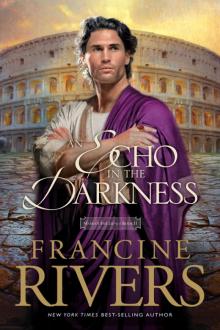 An Echo in the Darkness
An Echo in the Darkness A Lineage of Grace
A Lineage of Grace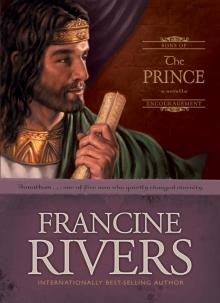 The Prince: Jonathan
The Prince: Jonathan Bridge to Haven
Bridge to Haven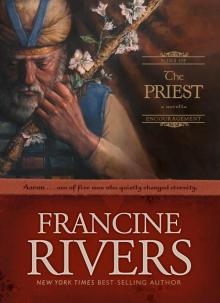 The Priest: Aaron
The Priest: Aaron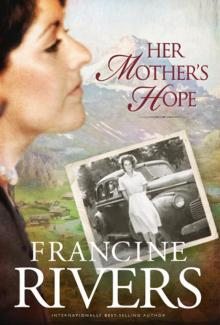 Her Mother's Hope
Her Mother's Hope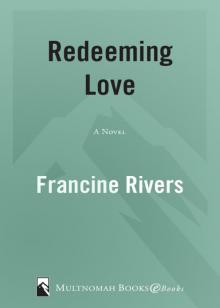 Redeeming Love
Redeeming Love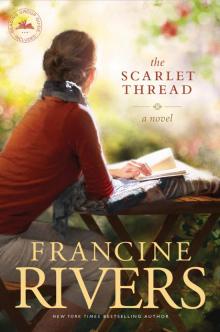 The Scarlet Thread
The Scarlet Thread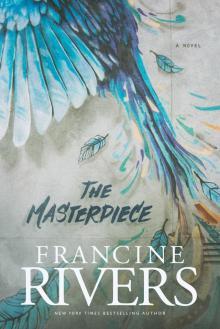 The Masterpiece
The Masterpiece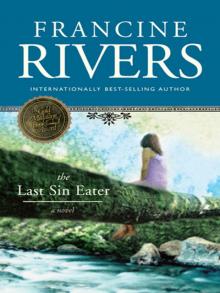 The Last Sin Eater
The Last Sin Eater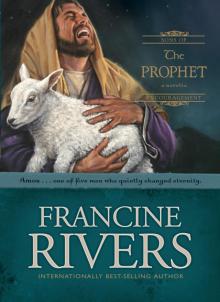 The Prophet: Amos
The Prophet: Amos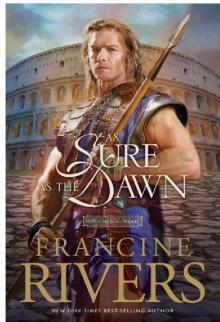 As Sure as the Dawn
As Sure as the Dawn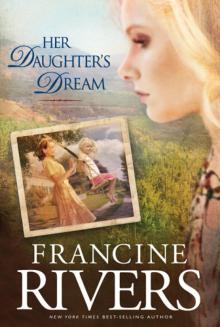 Her Daughter's Dream
Her Daughter's Dream A Voice in the Wind
A Voice in the Wind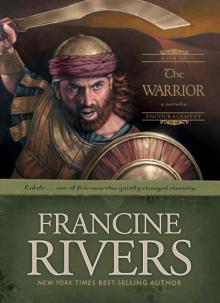 The Warrior: Caleb
The Warrior: Caleb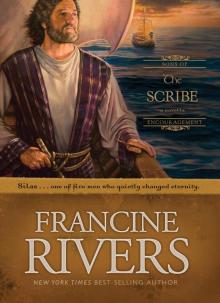 The Scribe: Silas
The Scribe: Silas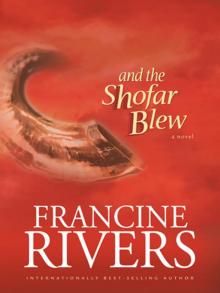 And the Shofar Blew
And the Shofar Blew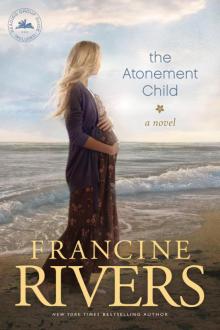 The Atonement Child
The Atonement Child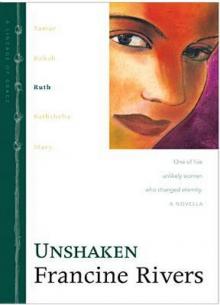 Unshaken_Ruth
Unshaken_Ruth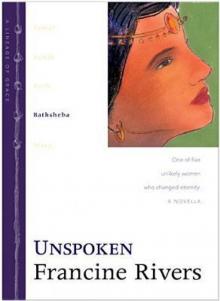 Unspoken_Bathsheba
Unspoken_Bathsheba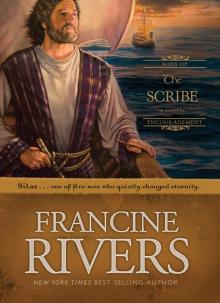 The Scribe
The Scribe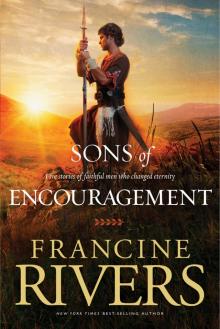 Sons of Encouragement
Sons of Encouragement The Shoe Box
The Shoe Box Sycamore Hill
Sycamore Hill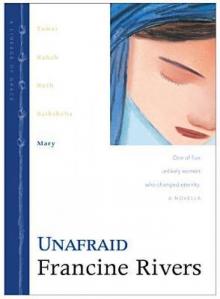 Unafraid_Mary
Unafraid_Mary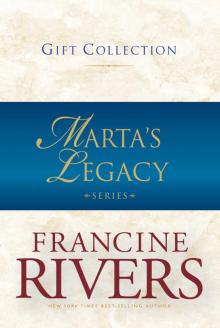 Marta's Legacy Collection
Marta's Legacy Collection